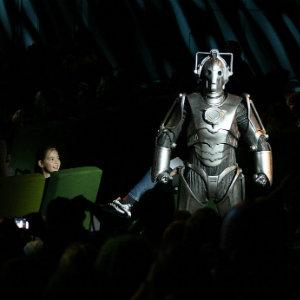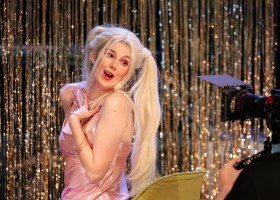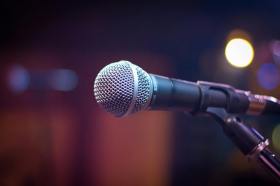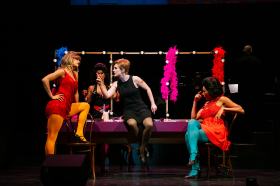What I can’t overlook, however, is that the music being showcased is no more than one might expect of a television soundtrack, and everything is heavily amplified – perhaps unavoidable in the Convention Centre’s sprawling Plenary Hall, which was not built with good acoustics in mind. The warmth and lingering sustain of live instruments and voices is entirely negated, giving audiences little idea of the aural qualities of an orchestral concert. Nor does the program, which comprises Murray Gold’s music from modern Doctor Who‘s fifth and sixth seasons (the inspiration for this concert, the BBC Doctor Who Proms, also included some popular classics – a sensible move for what’s designed, at least in part, to be an orchestral primer).
Gold’s music is competent and conventional, intended to enhance what’s taking place on screen rather than stand alone as inspired or surprising listening. So there’s lots of strings for poignant moments, and electric guitar and percussion for action-adventure, for example – as we can see in the relevant Doctor Who scenes projected on a large screen above the orchestra (sometimes with audible dialogue).
The MSO, augmented with electric guitars and keyboard, and Concordis Chamber Choir tick the boxes under the baton of Ben Foster. Soloists Antoinette Halloran and Tobias Cole sing pleasantly in the upper register – mostly ethereal, inarticulate sounds in the style of the Cocteau Twins and Lisa Gerrard.
The dependable, mildly pandering MC is Mark Sheppard, who played Canton Delaware III in season six – a minor role, but the audience, in true fanboy fashion, give him a rousing welcome; perhaps his other minor sci-fi roles, including in the outstanding Battlestar Gallactica reboot, helped.
 |
Other Whovian treats include a recorded video message from current Time Lord extraordinaire Matt Smith (the host of the BBC Doctor Who Proms – suck it, Melbourne!), as well as some of his foes regularly moving through the venue as further visual distraction from the so-so music. These include newcomers the Silence, and old favourites the Daleks and Cybermen. Thanks to the show’s high production values in recent years, these costumed performers look fantastic; while the made-over Daleks still look naff, seeing them in the flesh, as it were, and hearing that piercing, effects-heavy Dalek voice massively amplified, certainly is a showstopper.
The highlight of the concert is the encore: Ron Grainer’s iconic 1963 Doctor Who theme. Designed to grab one’s attention, rather than enhance an on-screen story, this is powerful, iconic stuff. Experiencing it as a wall of sound, with every instrument and voice on stage cranked up, is exhilarating, yet the superfluousness of a live orchestra is underlined more than at any point in the concert. For all the MSO’s sawing at strings and blowing of horns, electric guitars and keyboards are the most prominent instruments in the hugely amplified mix (this is TV’s first purely electronic theme tune after all).
At times I wondered why we didn’t just listen to a recording turned up to 11. I suspect that combining it with this concert’s almost constant eye candy would have also been rewarded with a standing ovation.
Rating: 2.5
Doctor Who Symphonic Spectacular
Melbourne Symphony Orchestra
Composer: Murray Gold
Conductor: Ben Foster
Presenter: Mark Sheppard
Soloists: Antoinette Halloran, Tobias Cole
Melbourne Convention and Exhibition Centre, Plenary Hall
February 4






